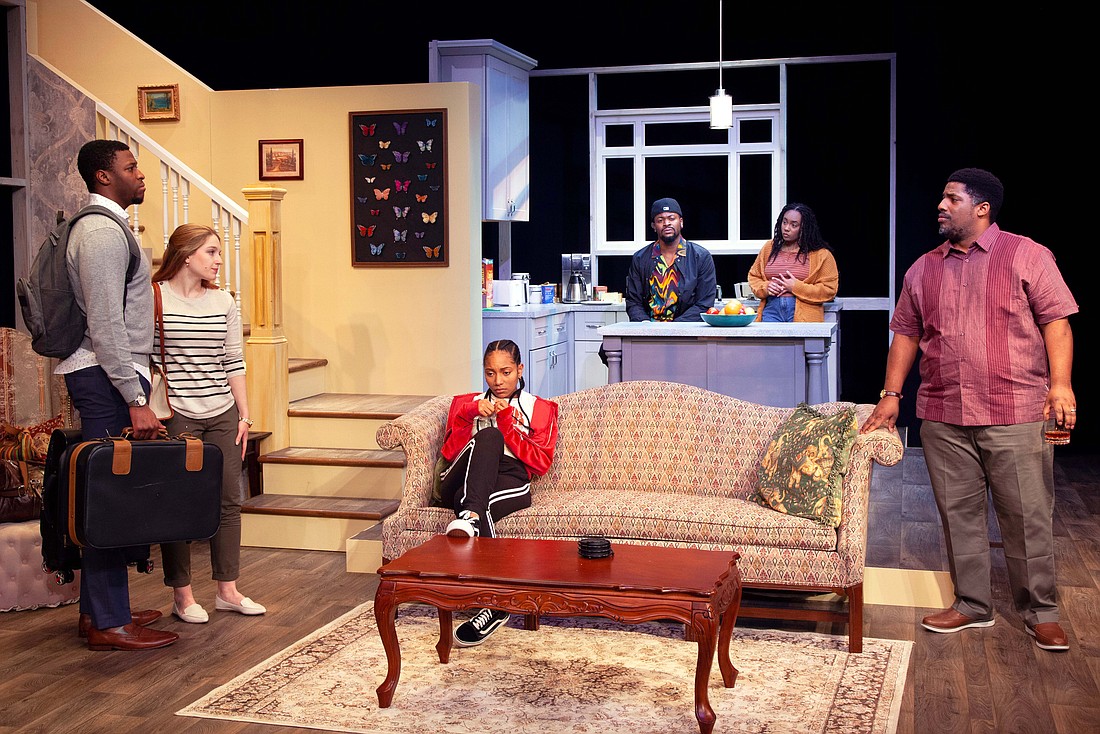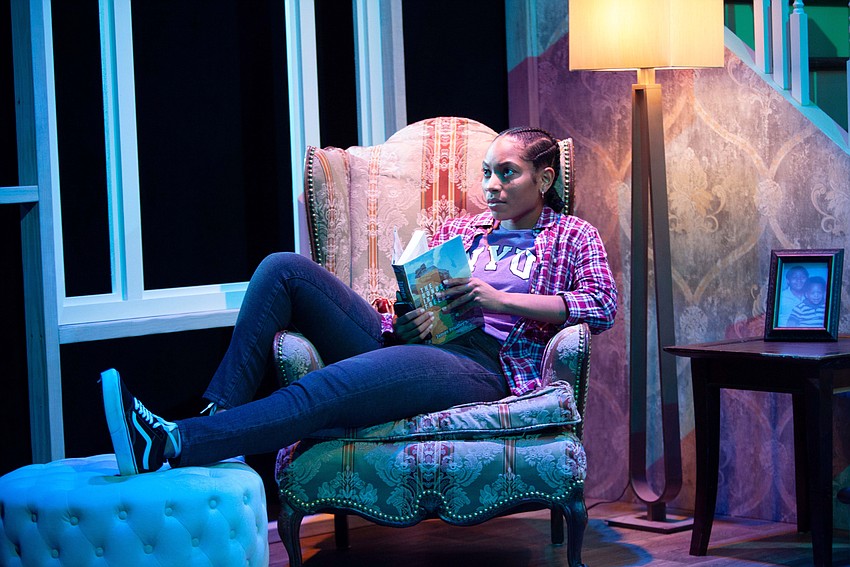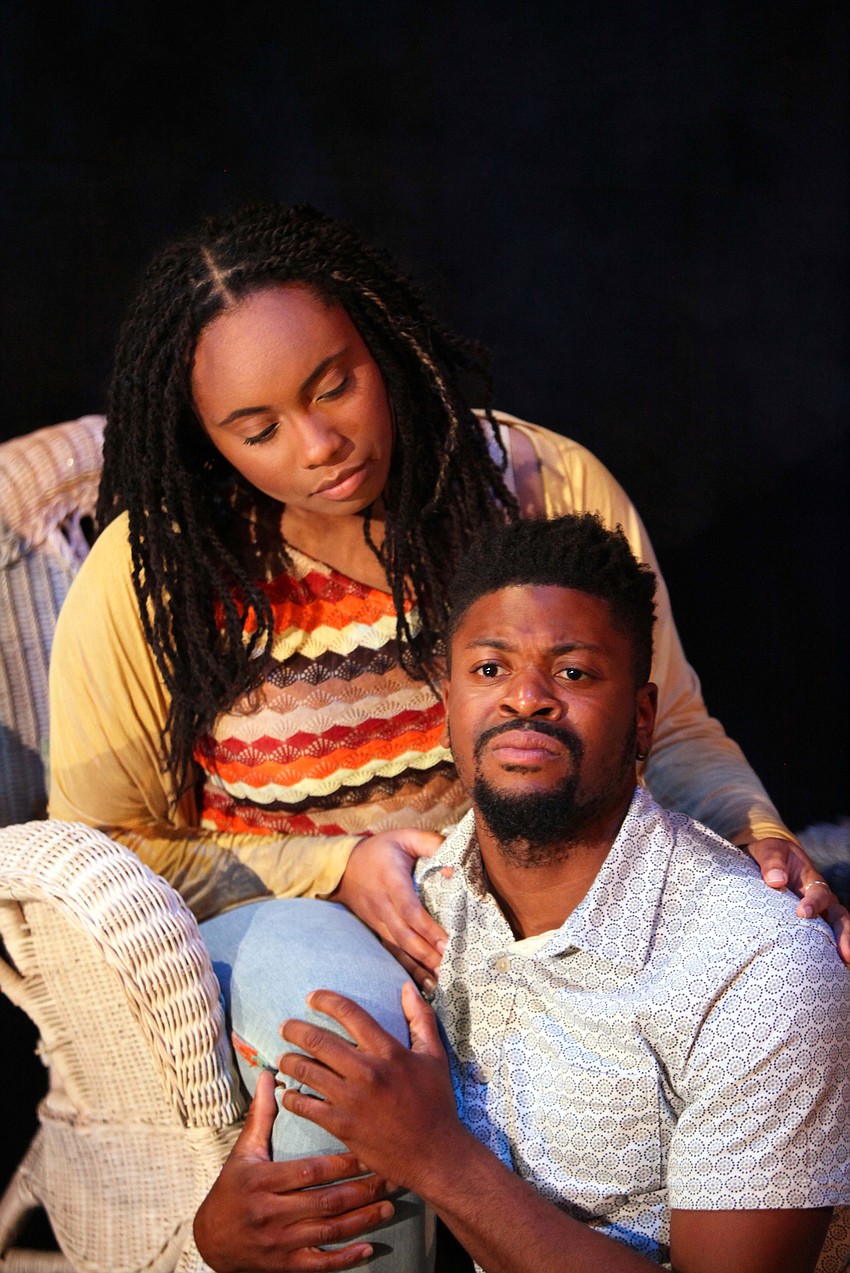- July 8, 2025
-
-
Loading

Loading

Family reunions tend to go badly in movies and TV. Lydia R. Diamond’s “Stick Fly” is no exception. It’s not a Swedish movie, so nobody’s accused of child abuse. It’s not an Italian movie, so nobody gets shot. But a basket of one family’s dirty laundry is dumped on stage. That’s shocking enough.
The LeVays are the family in question. They’re an affluent Black family with a vacation home in Martha’s Vineyard. That’s where the secrets are gradually unpacked over a very long weekend. Before the revelations, there’s just a hint of tension.
Dr. Joe LeVay (Rueben Wakefield) is the family patriarch. As patriarchs go he’s, well, patriarchal. Joe is a man of few words. He doesn’t ask; he tells. Or judges. He’s a cold-eyed realist. In the good doctor’s mind, material success equals success. That’s the way it is — and sentimentality or self-expression be damned. Joe’s retired from practice as a neurosurgeon. But his words can cut like a scalpel.
The oldest son, Flip (Ibukun Omotowa), is Joe’s favorite, and it’s easy to see why. He followed in his father’s footsteps and is now a thriving plastic surgeon. Like his father before him, Flip’s also a sweet-talking womanizer. Speaking of which, Joe is introducing a mystery girlfriend over the weekend. He made a point of arriving first — and divulges zero details about her. His secrecy creates suspicion. What’s he hiding? It turns out, it's the fact that she’s white.
Kimber (Danielle Vivcharenko) is a social worker whose ideas and ideals are in the right place. She avoids the obvious microaggressions. Usually. Her love for Flip seems genuine.
Kent (aka “Spoon” — played by Rickey Watson Jr.) and his girlfriend, Taylor (Rebecca Rose Mims), have both arrived — at least physically. Kent has not arrived in terms of his career. He’s a budding novelist. That’s not empty words. He has a galley proof from a real publisher. But his father is not impressed. To Dad, writing is not a real profession. His summary judgment? “You‘re a very talented fiction writer for whom I paid to get a law degree, a business degree and a master’s in sociology.”
Taylor’s an entomologist — and something’s bugging her. Taylor has a very short fuse — and practically bites Kimber’s head off. You discover that her father was a prominent historian. But his actions fall short of his idealistic image. He walked out on Taylor and her mother (a college professor) when he found a second wife. Taylor’s mother scrimped, saved and raised her on her own. Taylor’s famous family name opens a few doors, but she’s also financially struggled.

Cheryl (Trezure Coles) is the daughter of the family maid. Her mother is sick, so she’s filling in. She’s briskly efficient, but doesn’t seem too happy. Taylor tries to make nice, but she’s getting on her last nerve. What’s eating her? Well, that’s another revelation — and one that I won’t spoil.
What’s Joe got to hide? Why is his wife missing in action?
I won’t spoil those either.
What the heck is a “Stick Fly”?
That’s no secret. Before the play, I assumed it was a baseball term. But it’s entomological jargon — and shoptalk for scientists like Taylor. As she explains, flies are too fast to film when they’re actually flying. Entomologists superglue them to Popsicle sticks and film their reactions to three-sided movie screen projecting drone footage moving through a landscape. The flies think they’re flying, and adjust their wing speed and orientation accordingly. This fun fact connects to Taylor’s childhood survival strategy.

It began with her mother’s advice in childhood. Taylor had asked why kids in her school divided into racial lines on the threshold of puberty. Mom’s response?
“Mom was damned if she was going to spell it out for me. So she was like: 'Look baby, you just have to look at everyone like they're bugs under a microscope. Like ants. Figure out the patterns.'”
Taylor put that strategy into practice. Basically, she learned to be a fly on the wall. She started with humans as a kid, then moved on to actual flies as an adult. I figure the playwright has a similar strategy — applied to humans (more on that later).
Director Marcus Denard Johnson has a light naturalistic touch. Under his direction, the characters feel like people, not like chess pieces on a board. The actors are good, too. They’re all at ease inside their characters’ skins.
Jeffrey Weber’s set is homey, but it’s not home. Lived in? Nope. It’s more like a vacation rental in somebody else’s home. April Andrew Carswell’s clever costumes are subliminal characterization. Nobody’s dressing down here. Each character is trying to make a good impression. The class distinctions are subtle, but Carswell weaves them in. Chris McVicker’s lighting and Alex Pinchin’s sound design add to the “Twilight Zone” sense of detachment from normal reality.
Despite all that creative talent, Diamond’s ambitious Chekhovian play doesn’t always take flight. Her dialogue’s good, her scenes are well constructed. So what’s the problem with the play?
I think there’s too much in it.
“Stick Fly” is packed with high-stakes issues. These include classism, racism, colorism, sexism, sexual morality, specific family history, the power dynamics within that family and the responsibilities of a Black intellectual in an imperfect pluralistic society. Offloading that heavy freight means shoehorning in plenty of speeches. Diamond disguises the Important Questions with the Styrofoam packing peanuts of ordinary chat. But the light talk is invariably pulled into some heavy issue. That gravitational pull drags everything down.
The heavy issues aren’t the problem. The play’s delivery system is.
“Stick Fly” reminds me of “The Lying Lives of Adults” — a streaming adaptation of Elena Ferrante’s novel. It’s also freighted with heavy issues and dark family revelations. But it’s a six-part mini-series, not a two-act play. Bottom line?
This is well worth seeing as a play.
But it’d work better as a mini-series.